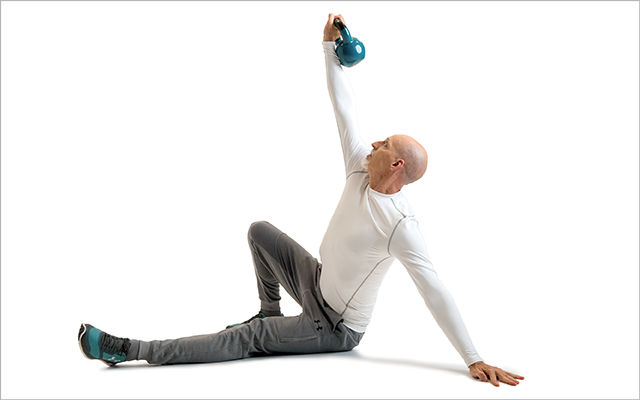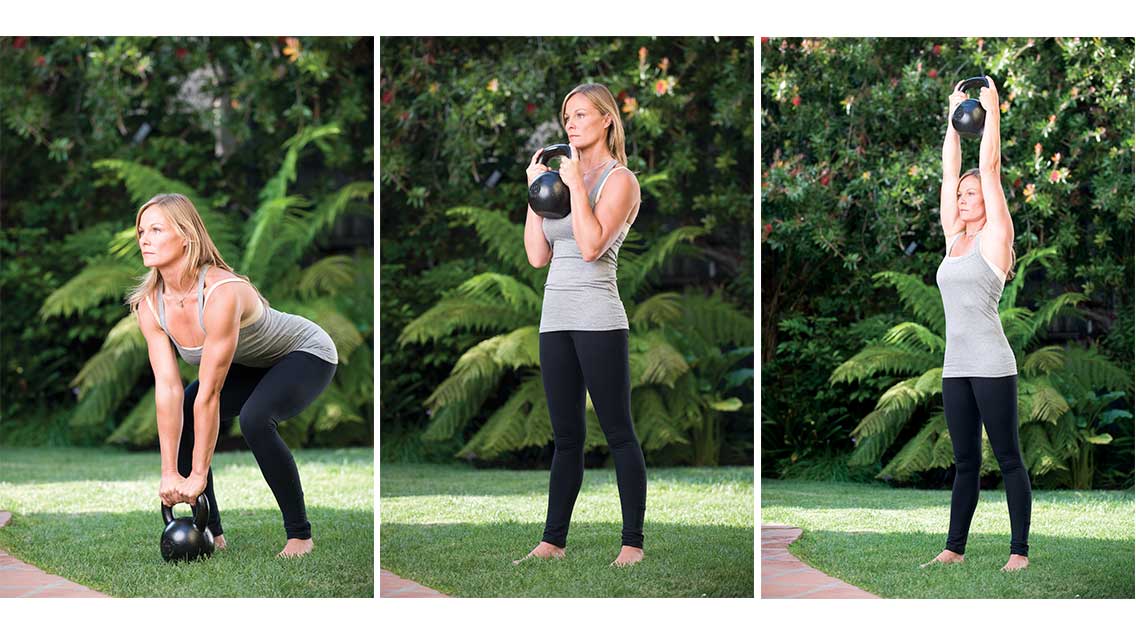Kettlebells are ideal for ballistic moves like snatches, cleans, and swings. But if that’s all you use them for, you’re missing out on their unique strength-building benefits.
Dumbbells and barbells are balanced by equal weight at both ends, but the kettlebell has an off-set center of mass. This means you have to actively grip it at all times to keep it steady, which translates into greater overall strength.
“The shape of the kettlebell lends itself to strengthening the stabilizers — the little muscles that assist us in our daily activities,” says Adrienne Harvey, RKC team leader and a senior Progressive Calisthenics Certified instructor in Durham, N.C. “You’ll learn how to recruit more muscle fibers overall, and that can help you create a tremendous amount of strength.”
All that active grip work also offers long-term health benefits. A study in the Lancet found that people with a strong grip may be less likely to die from heart disease or any cause than those with a weaker grip.
The kettlebell’s handle makes it a cinch to pick up and move around with one arm. This enables you to perform unilateral (single-arm or single-leg) exercises easily, which develops the functional strength you need in everyday life.
“Most things in life are not perfectly balanced. We do things one-handed or by lifting one foot at a time,” Harvey says.
Test out the benefits for yourself with Harvey’s kettlebell strength routine — no cleans, swings, or snatches required.
The Workout
This circuit, designed by kettlebell instructor Adrienne Harvey, combines grip-taxing kettlebell moves with unweighted exercises featuring a flat, open-hand position. Exercises like the pushups and mountain climbers included here offer time to relax your grip, says Harvey, which is imperative when working with weights heavy enough to tire out the hands — “which, incidentally, means heavy enough to build strength!”
That said, make sure to prioritize form over weight or speed, especially if you are a beginner. And keep your wrists straight and grip active for all the kettlebell moves.
If you’re new to kettlebell training, start with a lighter weight than you typically use with a dumbbell, Harvey advises. Because you have to work harder to stabilize a kettlebell, you may find that lifting a 25-pound kettlebell is more challenging than lifting a 25-pound dumbbell.
The Routine
Perform four to six rounds of the following circuit, resting as needed at the end of each round.
- Kettlebell goblet squat x 10 reps
- Kettlebell row with lunge x 8 reps per side
- Pushup x 10 reps
- Kettlebell march in place x 20 steps
- Mountain climber x 20 reps
Kettlebell Goblet Squat
Perform 10 reps
Full Instructions
- Don’t brace the weight against your body. Use your core and arms to keep the kettlebell at chest level.
- This squat variation is a surprising core challenge, Harvey says.
Kettlebell Row With Lunge
Perform 8 reps per side.
Full Instructions
- Hit your back, biceps, and shoulder muscles while also engaging your core and quads.
- Get maximum strengthening benefits by keeping your shoulders level as you row.
- Keep your elbow in tight against your body. Squeeze your shoulder blade at the top of the movement.
Pushup
Perform 10 reps.
Full Instructions
- Elevate your hands or drop to your knees to ensure great form.
- Pushups are great for building strength in the core, chest, back, arms, and even glutes.
Kettlebell March in Place
Perform 20 steps.
Full Instructions
- Strengthen your grip, core, and the muscles in your mid- and upper back.
- Maintain control as you raise one knee at a time.
For variations to experiment with, see “How to Do the Goblet March.”
Mountain Climber
Perform 20 reps.
Full Instructions
- Give your grip a rest with this classic conditioning move. Keep your shoulders strong and active during this exercise: “Don’t just hang between them,” Harvey says.
⊗ Perform four to six rounds of the circuit, resting as needed at the end of each round.
This originally appeared as “Beyond the Swing” in the November 2019 issue of Experience Life.




This Post Has 0 Comments